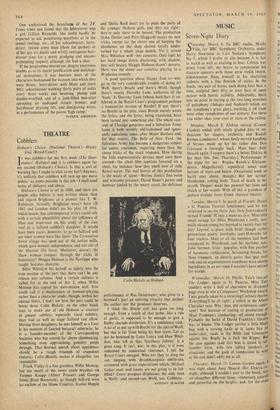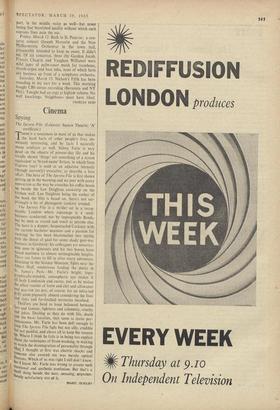MUSIC Seven-Night Diary
Caturday, March 6. To BBC studio, Maida k) Vale, for BBC Symphony Orchestra, under Harry Newstone in Carl Nielsen's Symphony No 5, which I prefer in .situ because it is fun to watch as well as exalting to hear. Celesta was down front left, the better to synchronise his staccato quavers with those eerie violin tweets. Sidedrummer flung himself at his shattering cadenza with a fine flourish of sticks. In the finale, two pair of horns, each doing four bars a lime, sculpted their fifty or sixty bars of open octave with heroic stolidity. Admittedly, there was no point in staring at the two long stretches of polyphony (Adagio and Andante) which are the symphony's great glory, marking it off from most other symphonies of our century. For these you either shut your eyes or stare at the ceiling.
Monday, March 8. Elektra revival (Covent Garden) ended with nicely graded dins of en- thusiasm for singers, orchestra and Rudolf Kempe (conductor), whose finely-nerved handling of Strauss made up for his rather dim Don Giovanni a fortnight back. Must hear Amy Shuard again. I suspect there's a better Elektra in her than this. [See Thursday.]- Performance of the night for me: Regina Resnik's Klytaem- nestra. Magnificently sepulchral notes near bottom of stave and below. (Occasional weak or harsh ones above, though.) But her acting! Handsome, rotting body. Taste of death in her mouth. Despair made her pummel her loins and clutch at her womb. With all this a grandeur of gesture straight from Greek classical theatre.
Tuesday, March 9. In porch of Friends' House a St. Pancras Festival functionary said he was surprised to see me there. Jazz Now had evidently turned Friends' H into a inauvais lieu. Miserably small turnup for Mike Westbrook's outfit, nor- mally eleven strong but boosted to twenty-four for Jazz Legend, a piece with brief though rather pretentious poetry interludes (anti-H-bomb) for four readers. Most or all the numbers had been composed by Westbrook and his baritone sax., John Surman. Style: pop-plus, with fine patches of harmonic ruthlessness. Screaming breaks for three trumpets, an electric guitar that spat steel rods and an argumentative trombone were among ingredients in an ear-rinse I wouldn't have missed for worlds.
Wednesday, March 10. Phyllis Tate's two-act The Lodger, again at St. Pancras. Miss Tate couldn't write a dull or charmless or ill-turned page even to win a Composers' Workshop award.
I was greatly taken by a recurringCockney chorus, 'Everything'11 be all right,' a rollick in the Albert Chevalier vein. Why, then, did restlessness super- vene? Not because of casting or production or Myer Fredman's conducting—all sound enough. Probably the build of David Franklin's libretto was to blame. The Lodger carries a little black bag with a carving knife in it, looks like an undertaker, reads in the Bible and fulminates against Sin. Really he is Jack the Ripper. But the case against (and for) him is stated in se' number form, with few telling incidents or situations: and the gush of compassion he wins at the end didn't edify me at all.
Thursday, March II. Covent Garden again• I was right about Amy Shuard. Her Elektra night, although 1 couldn't stay to the finish, was an altogether different thing—immensely assured and powerful on the heights, and, for the most
part, in the middle voice as well—but never losing that burnished quality without which such soprano lines pain the ear.
Friday, March 12. Back to St. Pancras: a con- certo concert (Joseph Horovitz and the New 'Philharmonia Orchestra) in the town hall, presumably intended to keep us sweet. It didn't me. Of six concertos, three (by Gordon Jacob, Francis Chagrin and Vaughan Williams) were mild japes of palm-court mush for trombone, mouth-organ and bass tuba, none of which have any business up front of a symphony orchestra.
Saturday, March 13. Nielsen's Fifth has been sounding in my ears for a week. This morning bought CBS stereo recording (Bernstein and NY Phil.). Tonight had an orgy at highish volume. No wall knockings. Neighbours must have liked.
CHARLES REID



































 Previous page
Previous page